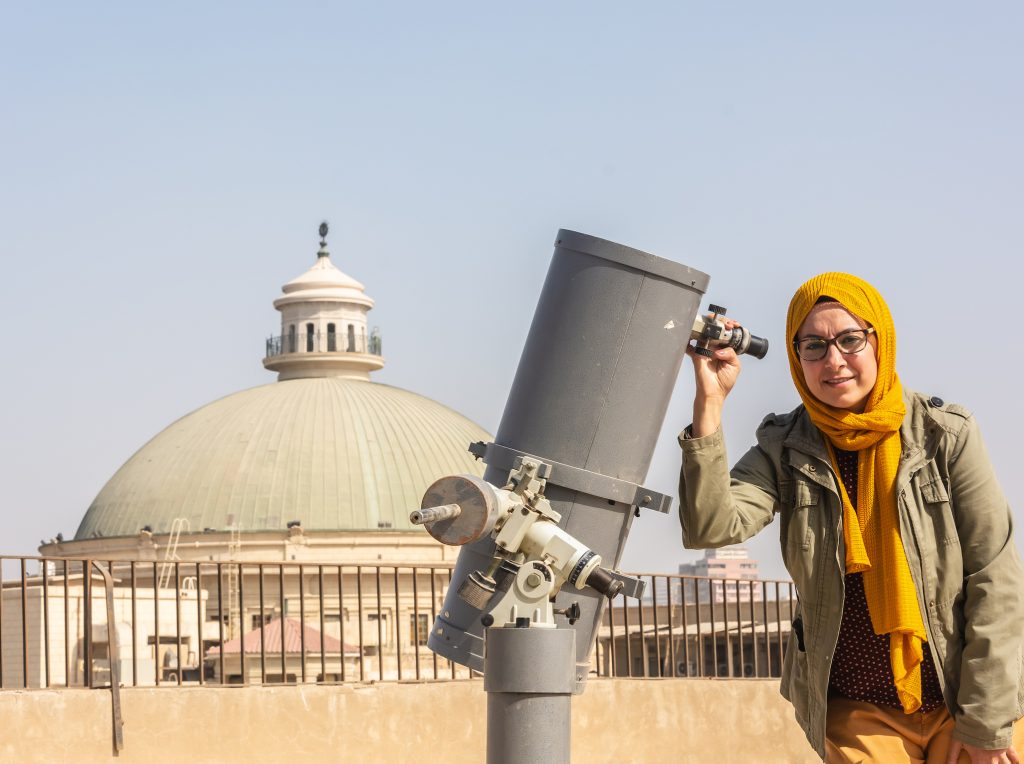Cape Town – 13 February 2023
The African Network for Women in Astronomy (AfNWA) is delighted to announce Dr Al-Shaimaa Hassanin as winner of the newly named “Prof. Carolina Ödman Early Career Award” for Women in Astronomy in Africa. The nomination acknowledges Dr Hassanin’s excellent contribution in science, efforts to advance women’s representation in science at different stages of their lives, and mentoring the next cohort of female astronomers. The aim of the award is to recognise and support the scientific achievements, and contributions to society, of women in Astronomy in Africa, and thus AfNWA and ISP are elated to present this prestigious award to someone who embodies their associations’ mission and values.
According to the AfNWA Board, the renaming of the award this year recognises Carolina Ödman’s passion for helping young people realise their dreams in astronomy. Professor Ödman was a founding member of AfNWA, and passed away in November 2022. Renaming the award in her honour acknowledges the vital role she played in the African astronomy community. Vanessa McBride, a fellow board member said “Carolina was instrumental in setting up a credible process and expert review panel for the AfNWA awards”. The winner of the prize is awarded €1,500 by the African Network of Women in Astronomy (AfNWA), a committee of the African Astronomical Society through the inaugural Nature Research and Estée Lauder Inspiring Science Award given to Prof. Mirjana Pović, and by the International Science Programme of Uppsala University in Sweden. The winner is invited to give a plenary talk about her research and advocacy work at the annual conference of the African Astronomical Society in March 2023.
Prof. Carolina Ödman Early-Career Award: Dr Al-Shaimaa Hassanin, Cairo, Egypt

Dr Hassanin is an assistant professor of astrophysics at Cairo University in Egypt. Her PhD degree, obtained in 2018 from Potsdam University in Germany, was funded through a highly competitive DAAD (German Academic Exchange Service) scholarship. Her research centres around the violent behaviour of the sun. She models solar activity and compares these models with observations, using them to explore space weather and its effects on Earth. Her lab is the first of its kind in both Egypt and the wider Middle East and North Africa region, and she leads a number of students, mostly female.
Among other awards, Dr Hassanin received a L’Oréal-UNESCO For Women in Science postdoctoral prize grant in 2020. Dr Hassanin’s mentorship role extends beyond the academic: she serves on the organising committee for the International Astronomical Union’s (IAU) Working Group on Women in Astronomy, and is secretary for the IAU’s National Committee for Astronomy in Egypt. She places her advocacy for women in science into practice by creating an atmosphere in which female researchers, especially mothers, can thrive.
Notes to the editors:
African Network of Women in Astronomy (AfNWA)
AfNWA was set up in 2019 to connect and support women in astronomy across the African continent. It forms part of the African Astronomical Society, the professional society of astronomers in Africa. Astronomy is a growing field on the continent with new telescopes being built and producing innovative world-class science, such as the MeerKAT telescope in South Africa.
Contact: A/Prof. Vanessa McBride (vanessa@astro4dev.org) & Prof. Mirjana Povic (mpovic@iaa.es)
African Astronomical Society (AfAS)
The African Astronomical Society (AfAS) is the primary organisation representing professional astronomers from across the African continent and is funded by the Department of Science and Innovation in South Africa AfAS is based in Cape Town on the campus of the South African Astronomical Observatory.
Contact: Dr. Charles Takalana, charles.takalana@afasociety.org
International Science Programme
Uppsala University established the International Science Programme (ISP) in 1961. ISP has earned international recognition for effectively strengthening research and postgraduate education capacity in low and lower-middle income countries in the basic sciences chemistry, mathematics and physics.
Contact: Prof. Carla Puglia, carla.puglia@physics.uu.se
Photo: Supplied
